Barack Obama, Mike Pence harden ‘Obamacare’ battle lines at Capitol
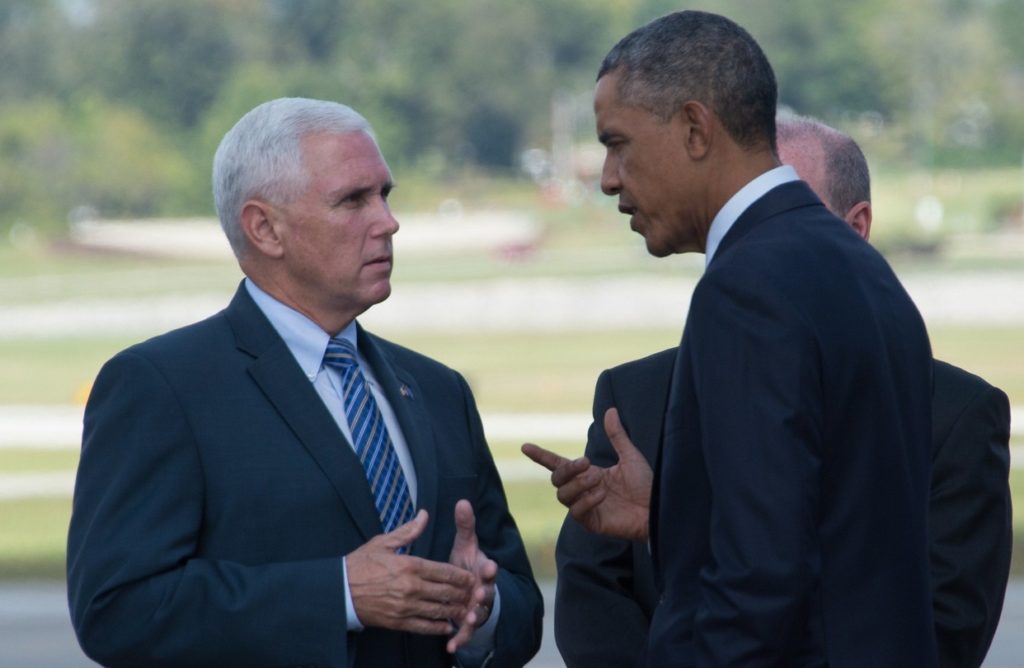
Hardening battle lines for the brawl to come, President Barack Obama urged congressional Democrats to “look out for the American people” in defending his legacy health care overhaul, while Vice President-elect Mike Pence stood firm Wednesday in telling Republicans that dismantling “Obamacare” is No. 1 on Donald Trump’s list. “We’re going to be in the promise-keeping business,” Pence declared at two separate Capitol news conferences. Just 16 days before Trump takes over the Oval Office, he said repealing and replacing Obama’s law will be the president-elect’s “first order of business.” “The American people voted decisively for a better future for health care in this country, and we are determined to give them that,” Pence said. Outnumbered in the new Congress, Democrats didn’t sound confident in stopping the Republicans cold but signaled they wouldn’t make the GOP’s job any easier. New Senate Minority Leader Chuck Schumer, D-N.Y., said that if the Republicans do scuttle the health care law, they will have to come up with a replacement plan before Democrats consider whether to help them revamp the system. That adds pressure on Republicans, who for years have battled among themselves over what a new law would look like, including how to finance its programs and whether to keep Obama’s expansion of Medicaid for more lower-income people. “They’re repealing, we’re not. It’s their obligation to come up with a replacement,” Schumer said, a sentiment he said he believed Democrats shared unanimously. Obama and Pence held dueling strategy sessions with lawmakers at the Capitol as the new Republican-led Congress commenced its drive to dissolve the health care statute. The 2010 overhaul, which has extended coverage to 20 million people and reshaped the nation’s $3 trillion-a-year health care system, has long stood as one of Obama’s proudest triumphs and the ascendant GOP’s top target for extinction. “Despite the negativity you have a big chunk of the country that wants this thing to succeed,” Obama told Democrats, according to an aide who attended Wednesday’s session. The two sides traded insults through the day. “Don’t let the Schumer clowns out of this web,” Trump wrote on Twitter. Said Schumer: “The Republican plan to cut health care wouldn’t make America great again, it would make America sick again.” Previewing an attack line sure to be heard again in this year’s debate, House Minority Leader Nancy Pelosi said the GOP is aiming to also scuttle Medicaid and Medicare, going after programs that are “very personal in the lives of the American people.” Even with White House and congressional control, annulling “Obamacare” and replacing it looms as a daunting task for the GOP. Leaders hope to have legislation voiding much of the law on Trump’s desk by late next month, Republicans said. But after six years of failing to unite behind an alternative, GOP leaders are discussing postponing when repeal would take effect for 18 months or longer, allowing more time to craft replacement legislation. Underscoring the law’s widespread constituency, the Obama administration said at least 8.8 million people signed up through Dec. 31 for coverage in 2017. Even so, outside experts doubt the administration will meet its nationwide target of 13.8 million signups. Millions more have coverage under the statute’s Medicaid expansion. Trump has provided few details about how he would redesign the law, but has said he wants to retain popular provisions like ensuring coverage for people with pre-existing medical problems. Republicans will also need to figure out how to protect health coverage for millions of Americans during a transition period and how to avoid market-place bedlam as nervous insurance companies stop selling policies or boost rates. Seemingly acknowledging that danger, Trump tweeted warnings to GOP lawmakers. “Massive increases of ObamaCare will take place this year and Dems are to blame for the mess,” he wrote. “It will fall of its own weight – be careful!” Republicans said Pence told them in their private meeting to argue that Democrats broke the health care system and Republicans will fix it. Trump’s team is already working with GOP congressional leaders on plans to undo Obama’s law with both legislation and executive action that the president and federal agencies would be able to take, Pence said. Lawmakers said that according to Pence, Trump would sign some orders the day he takes office. Pence did not specify what those actions would be. But House Speaker Paul Ryan, R-Wis., told reporters they would involve “transition relief.” In the Democrats’ meeting, Obama accepted some blame for not sufficiently promoting it. “The president said, I guess we all could have done a better job of messaging to the American people,” said Rep. Joe Crowley, D-N.Y. Obama made his remark about looking out for the American people as he left the meeting. Meanwhile, the Senate voted 51-48 Wednesday to begin debating a budget that, once approved, will prevent Democrats from using a filibuster to block future Republican legislation to void the health care law. Republicans control the Senate by 52-48, but it takes 60 votes to end a filibuster, a procedural roadblock that can kill legislation. The Senate is expected to complete the budget by next week, with House approval to follow. Republished with permission of the Associated Press.
Top Senate Dem warns Donald Trump on Supreme Court pick
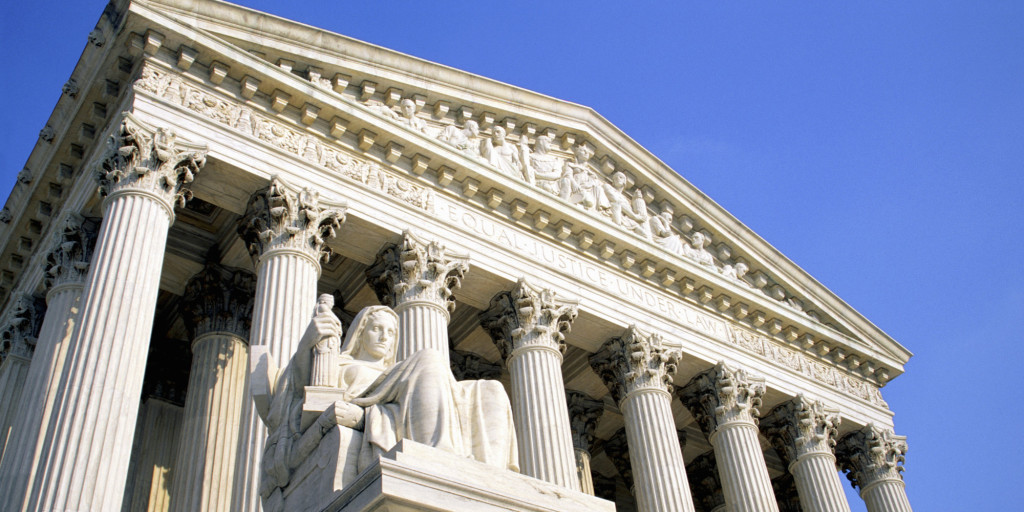
The top Democrat in the Senate is warning President-elect Donald Trump about his eventual Supreme Court choice: Name a “mainstream” nominee or Democrats will oppose the individual “with everything we have.” “My worry is, with the hard right running the show, that the likelihood of the nominee being mainstream is decreasing every day,” New York Sen. Chuck Schumer said Wednesday in an interview. Schumer made the comments a day after saying on MSNBC’s “The Rachel Maddow Show” that Democrats will “absolutely” do their best to keep the Supreme Court seat open if Trump doesn’t nominate someone whom Democrats could support. The seat has been vacant for 11 months since the death of Justice Antonin Scalia last February. Senate Majority Leader Mitch McConnell, R-Ky., blocked consideration of President Barack Obama‘s nominee, Judge Merrick Garland, saying the next president should make the pick. The strategy paid off, and the Republican Senate will consider whomever Trump nominates. As minority leader, Schumer won’t have the same power as McConnell to block a nominee. But his words signal that Democrats could filibuster and force Republicans to round up 60 votes to move ahead. That will be a challenge for the GOP since they only hold 52 seats. If Republicans can’t get enough Democratic votes, then they do have another option – change the rules and curb the filibuster for Supreme Court nominees. Former Senate Majority Leader Harry Reid, D-Nev., did that for lower court nominees and other nominations in 2013. Schumer didn’t define what he meant by “mainstream.” But he did say on Maddow’s show that Garland, Obama’s unsuccessful pick, was “a very moderate, mainstream nominee.” Garland has been considered a liberal-leaning moderate in his years on the U.S. Court of Appeals for the District of Columbia Circuit. Republished with permission of the Associated Press.
Repeal ‘Obamacare,’ but don’t hurt consumers, Mike Pence says
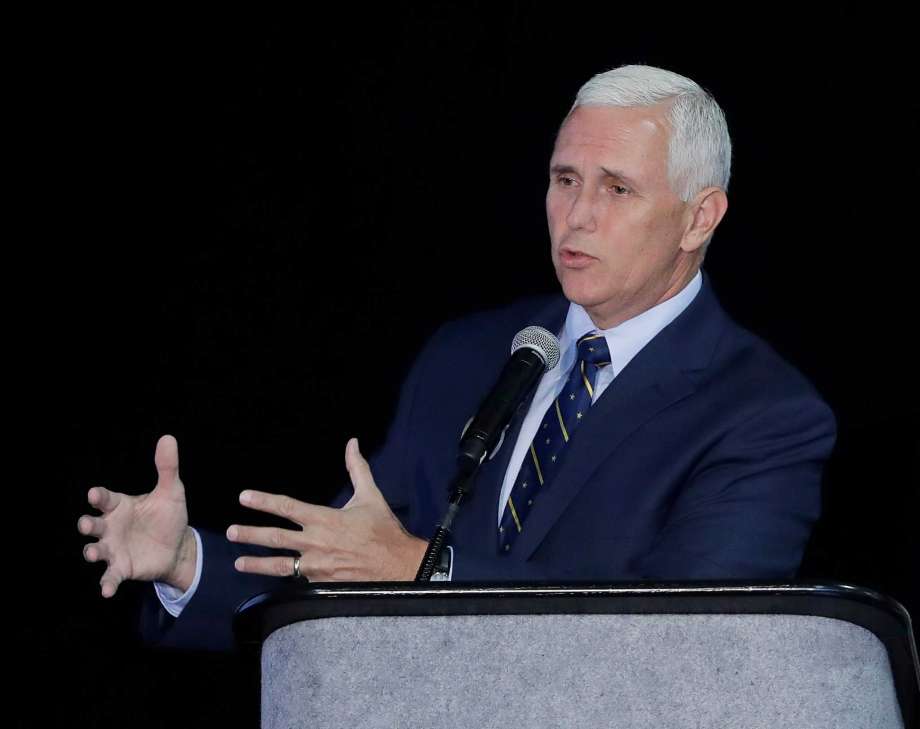
Donald Trump‘s “first order of business” as president will be to repeal and replace “Obamacare,” but Republicans must avoid hurting consumers as they do it, Vice President-elect Mike Pence said at the Capitol on Wednesday. President Barack Obama visited Congress, too, 16 days before leaving the White House, championing his landmark overhaul before Democratic lawmakers and urging them to remind voters of how the statute has helped them. “Look out for the American people,” Obama said as he left the meeting in response to shouted questions as to what he had told fellow Democrats. “Keep up the fight,” Obama told them at a strategy meeting, according to Rep. Tim Ryan, D-Ohio. “Tell the stories about the people who have benefited from it. The more you can get that message through, the better off we’re going to be.” Pence spoke to reporters after an hour-long session with House Republicans. Rep. Dave Brat, R-Va., said GOP leaders want to get legislation dismantling the health care law to Trump for his signature by Feb. 20. “The first order of business is to repeal and replace Obamacare,” Pence said, using the overhaul’s nickname. He said Americans “voted decisively for a better future for health care in this country, and we are determined to give them that.” Pence said Trump’s team was already working with GOP congressional leaders on plans to undo Obama’s law with both legislation and executive action the president and federal agencies would be able to take. Pence did not specify what those actions would be. But House Speaker Paul Ryan, R-Wis., told reporters they would involve “transition relief.” That phrase has been used to describe help for consumers and insurers while Obama’s law is being phased out and replaced with a GOP alternative, a process expected to take years. Republicans are discussing delaying the timing for major provisions of the change to actually take effect, perhaps to 18 months or more. It is expected to take at least that long for GOP lawmakers to rally behind a plan. Obama’s and Pence’s strategy sessions came on the second day of the new, GOP-led Congress. The Senate voted 51-48 Wednesday to begin debating a budget that, once approved, will prevent Democrats from using a filibuster to block future Republican legislation to scuttle the health care law. Republicans control the Senate by 52-48, but it takes 60 votes to end a filibuster, a procedural roadblock that can kill legislation. The Senate was expected to complete the budget by next week, with House approval to follow. Minutes before Obama and Pence met with lawmakers, Trump tweeted that voters are faulting Democrats for the health care law and its rising premiums, deductibles and other problems. “Massive increases of ObamaCare will take place this year and Dems are to blame for the mess. It will fall of its own weight – be careful!” he wrote. Pence told reporters that the president-elect was referring to the need to protect consumers during the transition period. “Look, we’re talking about people’s lives, we’re talking about families,” Pence said. Trump pledged during the presidential campaign to erase Obama’s law, though he’s now said he wants to retain popular provisions like ensuring coverage for people with pre-existing medical problems. Plenty of questions remain, including the repeal bill’s details, costs and when it would take effect. Republicans also face divisions over potential replacement legislation. The budget legislation gives congressional committees until Jan. 27 – a blink of an eye for lawmakers – to write legislation repealing major parts of the health care law. Likely targets include the law’s tax penalties for people who don’t obtain insurance, its requirement that many companies cover workers and its tax increases on higher-earning individuals and many health care firms. Aware they have no chance of quickly agreeing on replacement legislation, Republicans plan to delay when their repeal would actually take effect. A range of 18 months to three years – perhaps longer – has been under discussion. Trump has provided few specifics about how he would revamp the nation’s $3 trillion-a-year health care system. Steps he and congressional Republicans have mentioned include greater reliance on tax credits to help people afford coverage. Republicans don’t want to abruptly end health care coverage for millions of voters who live in GOP-represented districts and states, or cause chaos in health care markets and prompt insurance companies to stop selling policies. So they are considering including provisions in their repeal bill to protect consumers and insurers during the transition period. Republished with permission of the Associated Press.
Barack Obama racial legacy: Pride, promise, regret — and deep rift
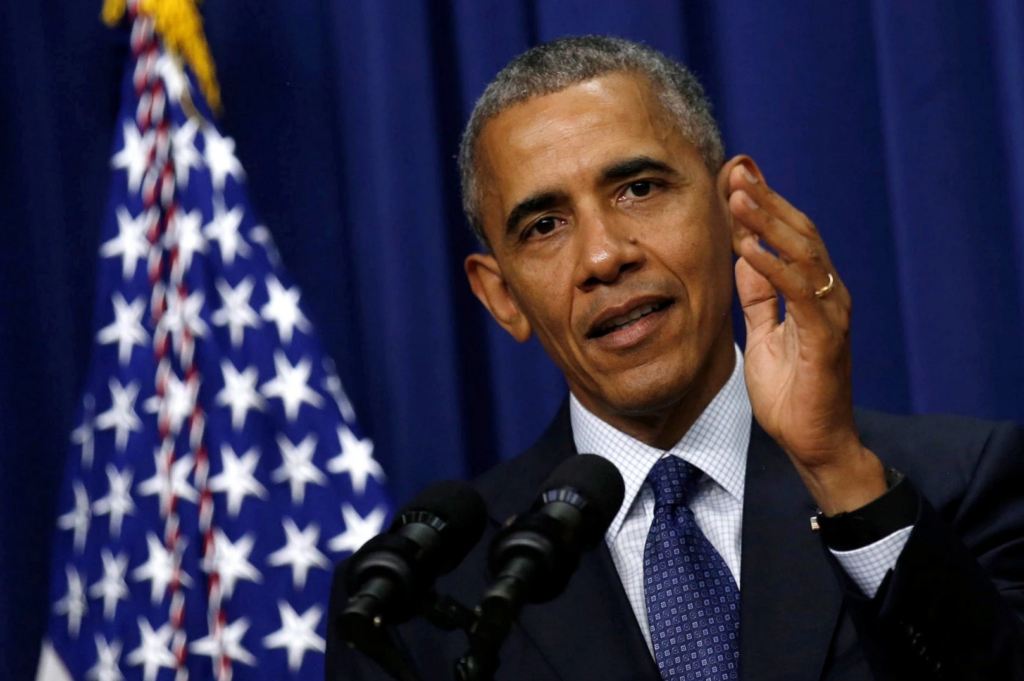
He entered the White House a living symbol, breaking a color line that stood for 220 years. Barack Obama took office, and race immediately became a focal point in a way that was unprecedented in American history. No matter his accomplishments, he seemed destined to be remembered foremost as the first black man to lead the world’s most powerful nation. But eight years later, Obama’s racial legacy is as complicated as the president himself. To many, his election was a step toward realizing the dream of a post-racial society. He was dubbed the Jackie Robinson of politics. African-Americans, along with Latinos and Asians, voted for him in record numbers in 2008, flush with expectations that he’d deliver on hope and change for people of color. Some say he did, ushering in criminal justice reforms that helped minorities, protecting hundreds of thousands of immigrants from deportation, and appointing racially diverse leaders to key jobs, including the first two black attorneys general. These supporters say he deserves more credit than he gets for bringing America back from the worst recession since the Great Depression, the killing of Osama bin Laden, and a major expansion of health care that secured insurance for millions of minorities. They celebrate his family as a sterling symbol of black success. But Obama also frustrated some who believe he didn’t speak out quickly or forcefully enough on race or push aggressively enough for immigration reform. And his presidency did not usher in racial harmony. Rather, both blacks and whites believe race relations have deteriorated, according to polls. Mounting tensions over police shootings of African-Americans prompted protests in several cities and the emergence of the Black Lives Matter movement. Perhaps most strikingly, the president’s successor, Donald Trump, is seen by many as the antithesis of a colorblind society, a one-time leader of the “birther” movement that spread the falsehood that Obama was born in Africa. Trump’s strong reliance on white voters was in sharp contrast to the multiracial coalition that gave Obama his two victories. “President Obama represents the face of the future – multicultural America. Donald Trump represents the old racial order of the black-white divide,” says Fredrick Cornelius Harris, director of the Center on African American Politics and Society at Columbia University. “And for the next decades to come, there will be a battle between those two viewpoints of what America is.” It took more than two centuries for America to elect a black president. It will take many years after he leaves office to sort out what it all meant. — “If he can do it, I can do it, too.” –Cheryl Johnson, of Chicago’s Altgeld Gardens public housing project, on Obama as a lasting symbol. — Two iconic images of the Obama presidency: The president patiently bends over as a 5-year-old black boy touches his head, after the child asked Obama if they had the same kind of hair. A 106-year-old black woman joyfully dances with the president and first lady, beaming as she declares: “I am so happy. A black president. Yay!” Born a century apart, these two visitors to the White House convey the potent symbolism of Obama’s presidency, a luster that hasn’t dimmed. For many black Americans, it’s not so much what policies Obama proposed but his mere presence in the Oval Office that has mattered most. “You can’t put a price tag on that,” says Loretta Augustine-Herron, a former community activist who worked with Obama in Chicago’s Altgeld Gardens in the 1980s. “If he never did anything else for African-Americans, just the fact that he occupies the White House, it lets us see ourselves in a different light. … We see a chance for us to fit into the United States society in a way we’ve never fit in. Just knowing that opportunity is not everybody else’s, it’s OURS, too. … The sky is the limit. And it was never that feeling before.” Perhaps nowhere are those sentiments stronger than at Altgeld Gardens, where a 20-something Obama honed his political skills as a community organizer. It was there, in the shadow of rusted steel mills, where Obama had his first up-close exposure to a black community mired in poverty. In his memoir, “Dreams from My Father,” Obama describes the sprawling housing project in “a perpetual state of disrepair” with crumbling ceilings, backed-up toilets and burst pipes. He helped residents agitate, rally and fight City Hall to improve their lives. Three decades later, Altgeld is in the middle of a massive renovation. Crime and poverty persist, but there’s also a sense of hope, especially for kids who, for the first time, see a president who looks like them when they walk by Obama’s photo on their schoolroom walls. Cheryl Johnson is among the few remaining residents who remember Obama’s organizing days. He plotted strategies with her mother, Hazel, a well-known environmental activist. Johnson, who followed in her footsteps, sees Obama as an inspiration. His presidency, she explains, allowed people to say: “If he can do it, I can do it, too.” “It’s the influence, the motivation that he has given to people who may have been hopeless in their life, like, ‘I can’t get this far,’” Johnson says. “Now you hear young people, young as 5 and 6, saying, ‘I’m going to be the next president of the United States.’” Obama changed perceptions of black people, says Ellen Singletary, a youth specialist at Altgeld. “The media depicts us … in such an unfair and defaming way,” she says, “and to see the pride of who we really are demonstrated on the world stage means the world to me.” That attitude is part of what Michael Eric Dyson, a Georgetown professor and prominent African-American commentator, described in a New York Times op-ed as black America’s “unrepentant love affair” with the president. That pride, he wrote, overlooks Obama’s failings, including skimping on black cabinet appointees until his second term, forgoing the nomination of a black woman to the U.S. Supreme Court and a
U.S.-led coalition doubles number of advisers in Iraq to 450

A U.S. military spokesman says the number of American and coalition advisers in Iraq has doubled in the past couple of weeks as Iraq pushes to recapture the Islamic State stronghold of Mosul. U.S. Air Force Col. John Dorrian says there are now about 450 coalition advisers in Iraq. Dorrian says an unspecified number of those advisers have been inside Mosul occasionally as part of the expanding effort to support Iraqi security forces as they fight dug-in militants. The advisers aren’t involved in direct combat, but are meant to provide specialized support such as analysis of intelligence. The Pentagon says there are 4,935 U.S. troops in Iraq, including trainers and other support forces. Dorrian spoke to Pentagon reporters Wednesday from his headquarters in Baghdad. Republished with permission of the Associated Press.
Donald Trump, with 2 tweets, helps push GOP reversal on ethics
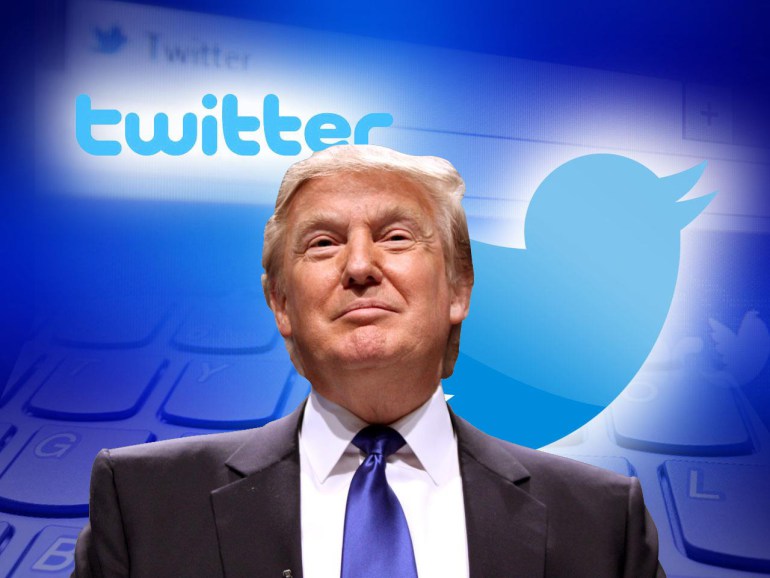
Every president taps a legislative affairs director to work with Congress. President-elect Donald Trump appears ready to use a legislative whip like none other: Twitter. On the opening day of Congress, Trump demonstrated the power of his 18.5-million Twitter followers and the clout of his populist credentials. With just a couple of tweets, the president-elect helped achieve what GOP leaders could not the night before, successfully pressuring House Republicans to reverse course on a plan to essentially scuttle an independent congressional ethics board. The move, only hours before Congress was sworn in, likely offered an early preview of how Trump intends to use his tech-savvy bully pulpit to persuade lawmakers who share his party but not all of his policy priorities. If Tuesday’s tactic is an example, the days of private back-channel negotiations and behind-the-scenes arm-twisting may be giving way to a new era of lobbying by social media shaming. “Virtually everything he does is a different style than Washington is used to,” former House Speaker Newt Gingrich said of Trump’s lobbying style. “He’s going to be very public, very aggressive.” By Trump’s standards, the tweets that piled pressure on lawmakers were relatively mild. After House Republicans voted in a closed-door session on Monday evening – a federal holiday – to undercut the independent Office of Congressional Ethics, government watchdogs and Democratic lawmakers railed against the move and people began calling their representatives. House Speaker Paul Ryan and Majority Leader Kevin McCarthy had opposed the changes, fearing exactly the kind of backlash that emerged. Then Trump weighed in with two Twitter messages Tuesday morning, writing, “With all that Congress has to work on, do they really have to make the weakening of the Independent Ethics Watchdog, as unfair as it may be, their number one act and priority.” The incoming president urged fellow Republicans to focus on top agenda items like a tax overhaul, health care and “so many other things of far greater importance!” His tweet ended with (hashtag)DTS – a reference to “drain the swamp,” a popular catch-phrase during his outsider presidential campaign. About two hours later, House Republicans, facing a deluge from angry constituents, dropped their plans to place the ethics board under their own control. The original rule’s author, Virginia Rep. Bob Goodlatte, saw his Facebook and Twitter pages bombarded with hundreds of critical messages. After Congress reversed course, Virginia resident Ed Heresniak celebrated on Goodlatte’s Facebook page, writing: “Dead. Trump killed it with a ‘tweet.’” Trump won’t rely on Twitter alone as his means of communicating with Congress. Vice President-elect Mike Pence, a former Indiana congressman, is expected to be a key conduit to lawmakers and was to meet with House Republicans on Wednesday. Trump has taken steps to fill out a more traditional congressional outreach team. He’s hired Rick Dearborn, a former aide to Alabama Sen. Jeff Sessions, as a deputy chief of staff and Marc Short, a top Pence aide, as the White House legislative affairs director. Both previously served in chief of staff positions on the Hill. They’ll have no shortage of work to do. Republicans in Congress differ sharply from Trump on major issues, including trade, Russia policy and entitlements. Trump seems ready to use the lobbying approach that fueled his campaign. As a candidate, he ridiculed his political opponents and detractors on Twitter, often in cutting personal terms, in a manner that his supporters said they found refreshing and direct. Fear of a Trump Twitter tirade could help congressional leadership, which has chafed with its own membership in recent years. That brash approach appeared to tame – for now – a rowdy group of House Republicans who have flummoxed both former House Speaker John Boehner and Ryan at times. “I don’t think there’s any question that the present-elect’s tweet this morning absolutely shifted the debate on this to where yesterday’s decision was reversed. There’s no two ways about it, because as of last night it was a done deal,” said Rep. Chris Collins, R-N.Y., one of Trump’s earliest and most vocal supporters in Congress. Collins, who serves as congressional liaison to the Trump transition team, said he didn’t receive any heads up about Trump’s opinion on the rules change before the president-elect tweeted. House GOP leadership aides said Ryan’s office was in touch with Trump’s transition team about the changes on Monday evening but Trump’s views were not clear until he fired off the tweets. It was also done in true Trump fashion, allowing some supporters to read into it what they want to believe. Trump didn’t flatly oppose the decision – he questioned the timing and the prioritization of it – and his tweets did not chastise lawmakers on the merits of their plan. By suggesting the watchdog apparatus under siege from lawmakers might be “unfair,” Trump spoke to lawmakers who have complained that they have been unfairly targeted by the independent ethics office. Trump had few admirers in Congress when he launched his campaign about 18 months ago but his tactics appear to be working – for now. “I’m not with him on everything, but on ‘drain the swamp,’ I will work with him on anything he wants to do,” said North Carolina Rep. Walter Jones, a Republican. “My hope is that his involvement will open a door for us. I’m not sure how wide, but a crack is better than no crack.” Republished with permission of the Associated Press.
Bill and Hillary Clinton to attend Trump inauguration
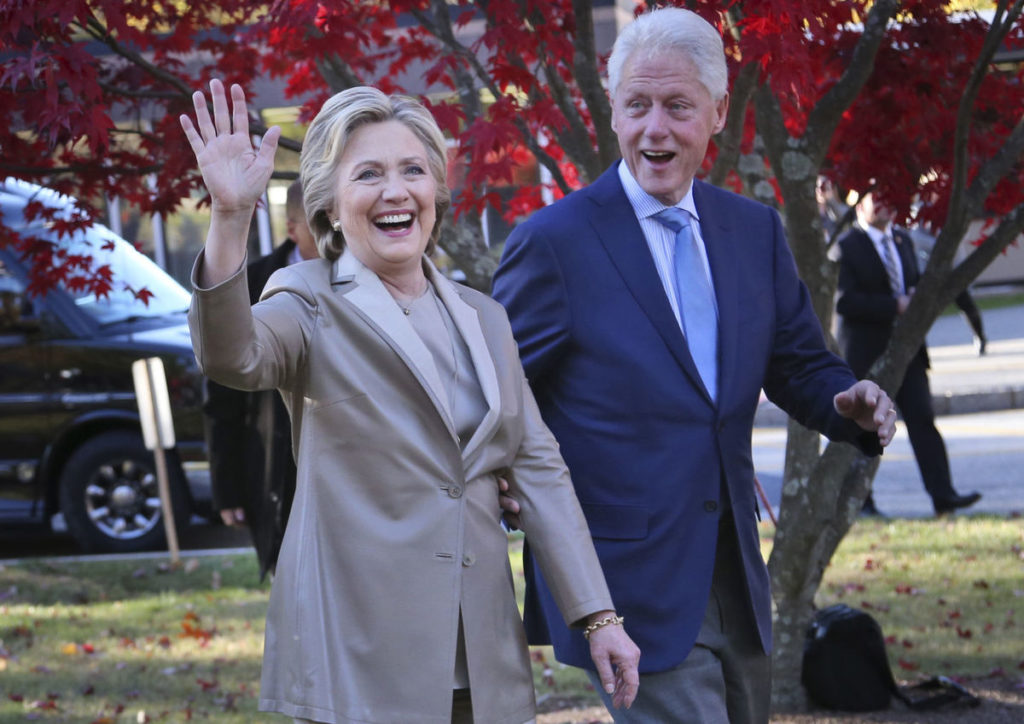
Falling in line with tradition, Bill and Hillary Clinton plan to attend Donald Trump‘s inauguration. It’s a decision that will put Hillary Clinton on the inaugural platform as her bitter rival from the 2016 campaign assumes the office she long sought. The Clintons announced their decision to attend the Jan. 20 inauguration shortly after former President George W. Bush‘s office said Tuesday he would attend along with former first lady Laura Bush. The Bushes are “pleased to be able to witness the peaceful transfer of power – a hallmark of American democracy – and swearing-in of President Trump and Vice President Pence,” Bush’s office said in a statement. It is traditional for former presidents and their spouses to attend the inauguration. But the decision to attend was fraught for the Clintons, given Hillary Clinton’s bitter campaign against Trump. The 2016 Democratic presidential nominee has largely avoided public appearances since Trump defeated her in November. Bush, too, has had a difficult relationship with Trump. His brother Jeb ran against Trump in the GOP primaries. George and Laura Bush let it be known they voted for “none of the above” for president rather than cast a ballot for Trump, but the ex-president did call to congratulate Trump after his victory. Former President Jimmy Carter and his wife, Rosalynn, earlier said they plan to attend Trump’s inaugural. Former President George H.W. Bush, 92, and his wife, Barbara, do not plan to attend the inauguration due to the former president’s age and health, his office said. Republished with permission of the Associated Press.
Megyn Kelly leaving Fox News, will host 2 shows on NBC

Megyn Kelly, the Fox News star who’s had a contentious relationship with President-elect Donald Trump, said Tuesday that she’s leaving the network for NBC News, where she will host a daytime talk show and a weekend newsmagazine, as well as contribute to breaking news coverage. NBC News made the announcement Tuesday, ending months of speculation over whether she would re-up with Fox, where she has flourished while suffering bruised feelings in recent months, or start a new chapter in her career. Her contract with Fox expires this summer. Her last show on Fox will be Friday night. Kelly’s departure deprives Fox News of its second-most-watched host, behind only Bill O’Reilly, and a hole at 9 p.m. in its prime-time lineup. “While I will greatly miss my colleagues at Fox, I am delighted to be joining the NBC News family and taking on a new challenge,” Kelly said in a message on Twitter on Tuesday. Rupert Murdoch, executive chairman of Fox, said that “we thank Megyn Kelly for her 12 years of contributions to Fox News. We hope she enjoys tremendous success in her career and wish her and her family all the best.” Kelly’s star power grew after she became a flashpoint in the presidential campaign after Trump objected to her questioning in the first Republican presidential debate a year and a half ago. He tweeted angry messages about her and boycotted another Fox debate after the network refused to replace her as one of the debate moderators. She also became a central figure in the downfall of former Fox News chief Roger Ailes, telling in-house investigators of inappropriate conduct by Ailes that supported women who had made similar accusations. Details about Kelly’s new jobs at NBC will be revealed in upcoming months, said Andrew Lack, chairman of the NBC Universal News Group. “Megyn is an exceptional journalist and news anchor, who has had an extraordinary career” Lack said. “She’s demonstrated tremendous skill and poise, and we’re lucky to have her.” Kelly wasn’t immediately available for comment about what made her choose to leave Fox. But she said in an interview with The Associated Press in November that the factors she was weighing “mostly involve a 7-, 5- and 3-year-old,” her children. Her Fox show airs live at 9 p.m., giving her no time at home with her children in the evenings. She stressed that point in closing remarks on her program Tuesday, which she addressed to the audience. Kelly said she valued the “human connection” the show gave her with viewers, but said she needed more of that connection with her children. She expressed gratitude to her next employer, NBC, and current one. “I am deeply thankful to Fox News for the wonderful 12 years I have had here. I’ve grown up here, and been given every chance a young reporter could ever ask for,” Kelly said. As a star in demand, Kelly was no doubt able to seek a schedule that would give her more time at home in the evening. A former lawyer who was raised in upstate New York, Kelly turned to television and got a job in Fox’s Washington office. She was noticed by Ailes, and given a daytime show. Her poise and sharpness, and willingness to ask tough questions of all political sides, made her a star and led Ailes to give her a coveted prime-time slot on cable news’ most-watched network. Her contentious relationship with Trump began when she asked the Republican businessman about statements he had made about women, infuriating him. He tweeted his disdain for her and although they made peace when Kelly interviewed Trump for a prime-time special last May, the relationship never became warm. Trump made Kelly’s prime-time colleague, Sean Hannity, his preferred stopping place for interviews during the campaign and didn’t come on her Fox News Channel show. “I really had to choose – am I going to be an honest journalist … or am I going to suck up to Trump?” she told the AP. “I chose the former, and it’s worked out fine for me.” It put Kelly in an awkward position with Fox News Channel viewers who favored Trump, however. At one point during a Hannity interview with Trump, a live audience at a Trump rally booed the mention of her name. Kelly’s immediate silence after Gretchen Carlson’s lawsuit last summer alleging unwanted advances from Ailes, at a time other Fox News personalities were supporting their boss, was telling. She told investigators that Ailes had made sexually suggestive comments to her and tried to kiss her, then made an angry reference to her contract when she rebuffed him. Ailes has denied any untoward advances involving Kelly. Her move was a big boost for broadcast network news divisions, which had struggled somewhat during the presidential campaign given the non-stop coverage provided by the cable news outlets. NBC News had recently been experimenting with a new Sunday night newsmagazine, “Dateline NBC: On Assignment,” hosted by Lester Holt in a traditional format with a mix of news and feature stories, a template Kelly is expected to use. Weekday “Dateline” editions focus on criminal justice stories. The move was a blow to Fox and its parent company, 21st Century Fox, whose leaders James and Lachlan Murdoch had made re-signing Kelly a priority and were believed in the industry to be offering her more money to stay. In her tweet on Tuesday, Kelly said she was deeply grateful to Fox News, its leaders and Fox’s viewers, “who have taught me so much about what really matters.” Kelly gave a signal of her future direction with last May’s interview special on the Fox broadcasting network. It wasn’t a critical or commercial success, however. Fox News does make in-house talent development a priority, however, and recently installed Tucker Carlson as a 7 p.m. host following the abrupt departure of Greta Van Susteren last summer. With Kelly taking a break over the holidays, Fox used Sandra Smith, Shannon Bream, Martha MacCallum and
Alabama politics in review: 2016 more interesting than expected
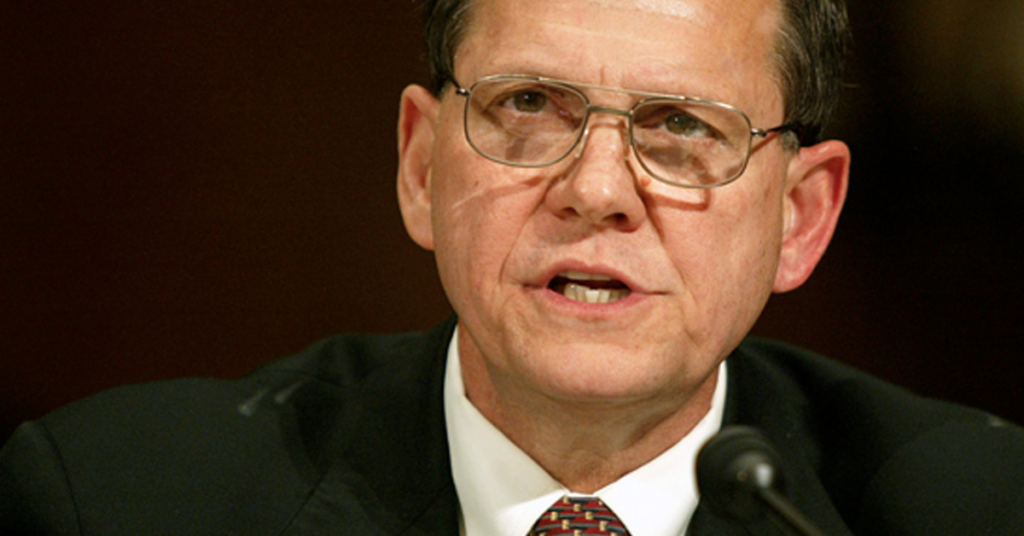
This past year in Alabama politics was surprisingly more interesting than was expected. The judicial inquiry commission removed Supreme Court Chief Justice Roy Moore from the bench for telling the probate judges in the state to not perform marriage ceremonies for gay people. He said marriage should be between a man and a woman, as do most people in Alabama. This removal by this vague panel of former lawyers and judges has caused legislators to call for an investigation of who this panel is and how they have this much power. More importantly, Judge Moore’s views and martyrdom has catapulted him into an early frontrunner position for the governorship of Alabama in next year’s upcoming election. He is prohibited from running for the Court again because he is 72 and Alabama law does not allow someone to run for judgeships after age 70. Therefore, it was expected that he was going to run for governor. However, his expulsion has propelled his polling numbers to strategic levels. Our good ole Dr. Gov. Robert Bentley’s saga played out over the year. It is titillating and fun to follow. However, it has pretty much rendered him somewhat irrelevant as governor. Donald J. Trump’s victory for the presidency is, of course, the biggest political story of 2016. It overshadows our shenanigans in Alabama. Trump is very popular in Alabama. His victories in our GOP primary and in the November General Election were record setting vote tallies for the Heart of Dixie. As we enter 2017, the beginning of the Trump presidency will be the news. His administration will and has already affected Alabama politics significantly. His Attorney General will be our own Senator Jeff Sessions. Our Senior Senator Richard Shelby has had one seat for 30 years and Sessions has been in the other seat for 20 years. Therefore, this open seat is a rarity and will be coveted. By law, the Governor appoints the holder of the vacant seat, which will be for an interim time. The election for the seat will probably occur at the same time as the governor’s race, which will be 17 months from now in the GOP primary in June 2018. The most qualified person to take the seat would be someone from our state congressional delegation, especially someone who has served in Congress from Alabama for a decade or more. The two who fit that bill and who are the most imminently qualified are Congressman Robert Aderholt and former Congressman Jo Bonner. Aderholt, who hails from Haleyville, has represented the 4th Congressional District for 20 years. That district runs from the Mississippi line to the Georgia line across north central Alabama and includes Jasper, Cullman, Gadsden and Tuscaloosa. Aderholt got to Washington at the amazingly young age of 31. Therefore, he is only 51 years old and is our most senior and thus most powerful congressman. He is a ranking member of the powerful Appropriations Committee and is in line to be chairman soon. He would be risking a lot and probably has the same power as a freshman U.S. Senator. He is on course to follow in the footsteps of his predecessor Tom Bevill, who was referred to as Alabama’s third senator. Jo Bonner represented Baldwin and Mobile in the 1st District for over a decade. He left a couple of years ago to accept an Economic Development position at the University of Alabama. He is very well-liked and respected in Washington and was positioned for a leadership post in the GOP Congress. His erudite and sincere demeanor would make him an effective Senator immediately, he also served in the House with a third of the Senators. The most likely to win the seat in the 2018 Election is Attorney General Luther Strange. He has run statewide three times successfully and has over a three-million-dollar head start name identification-wise. None of these three men have or will seek Bentley’s appointment. They all realize how unpopular Bentley is and know the history of appointments in Alabama politics. Bentley could redeem some respect and relevance if he went hat in hand to President Donald Trump and offered Trump his appointment. In that case, the governor’s choice would be Trump’s choice. The best choice to bridge the gap may be Perry Hooper Jr., who trumped for Trump in Alabama. See you next week. ___ Steve Flowers is Alabama’s leading political columnist. His weekly column appears in over 60 Alabama newspapers. He served 16 years in the state Legislature. Steve may be reached at www.steveflowers.us.


